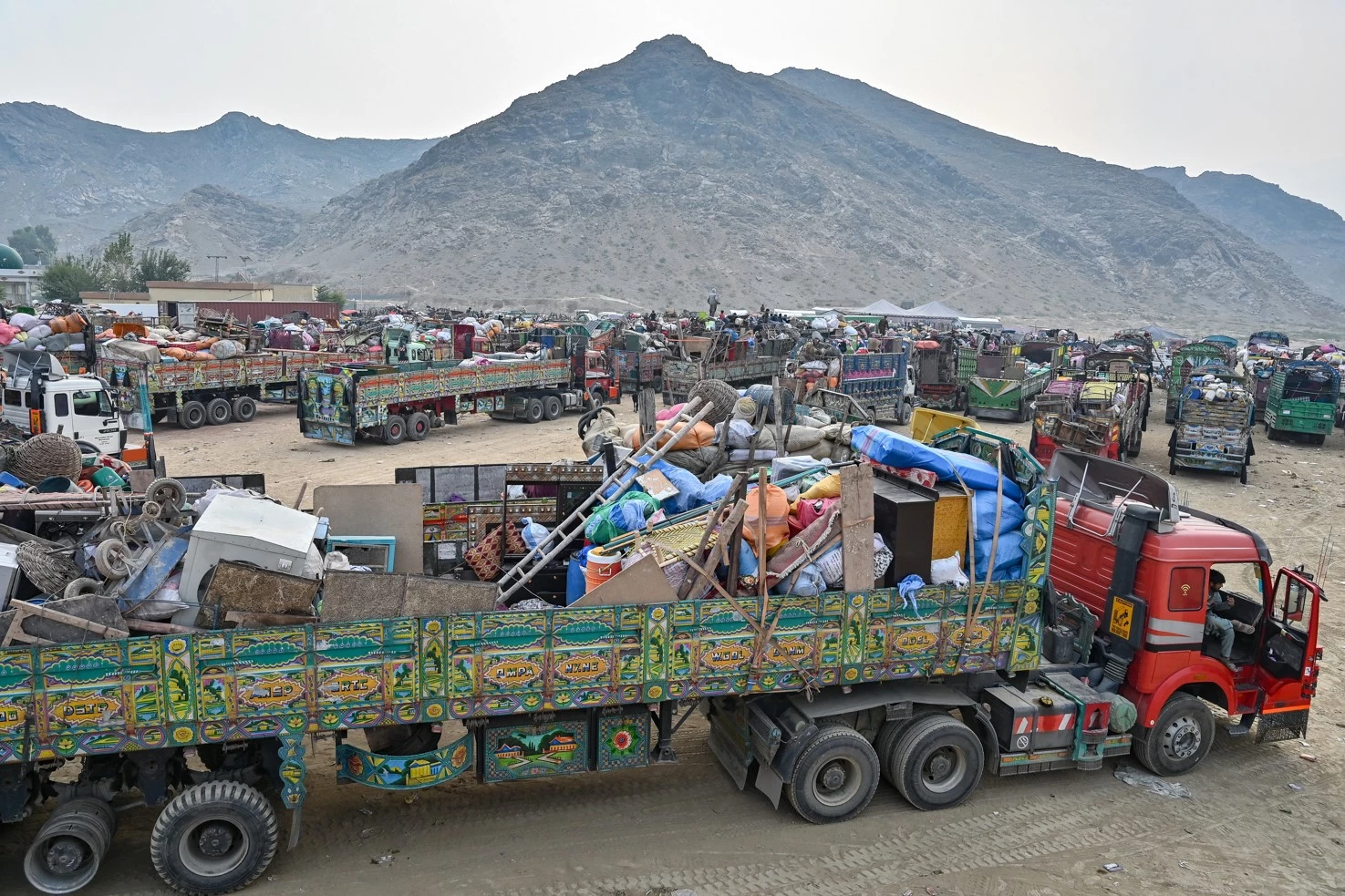Mass exodus as countrywide operation launched to deport illegal foreigners

Stay tuned with 24 News HD Android App

Hundreds of thousands illegal foreigners mostly Afghan nationals took to the border on Wednesday as the caretaker government launched a countrywide operation to deport aliens after the expiry of the deadline, reported 24NewsHD TV channel.
For the first time in country's history, the Interior Ministry issued instructions to all provinces to deport illegal foreigners under the Foreign Act 1946. The government warned of strict legal action if any Pakistani is found to be involved in harbouring illegal foreign nationals.
The repatriation plan will apply to all foreigners residing illegally in Pakistan. No country or nationality will be taken into account in the application of the plan.
The security forces have completed the process of identifying illegal Afghans by mapping and geo-fencing. Identification process of 200,000 illegal foreigners residing in Sindh has been completed.
Of the 300,000 Afghan citizens residing illegally in Khyber Pakhtunkhwa, individuals who do not leave voluntarily will be shifted to detention centers.
In Punjab and Balochistan, operation has also been started to deport illegal Afghans and their data is being checked by scanning.
In Karachi, a number of illegal Afghan nationals were arrested within the jurisdiction of Saddr police station.
A grand operation was launched at Al-Asif Square in Sohrab Goth against the illegal Afghan nationals. Police and Rangers took part in the operation.
Karachi (East) Senior Superintendent of Police (SSP) led the operation. Announcements were also made through speakers. The Sohrab Goth and Gulshan superintendents of police (SPs) also participated in the operation.
In Islamabad, 64 illegal Afghan nationals were sent back to their country through the Torkham border crossing. Dozens others were arrested in twin cities of Islamabad and Rawalpindi with federal police getting powers to take action against illegal foreigners.
Deputy Commissioner Irfan Memon sent the illegal Afghan nationals back to Afghanistan in two buses. “The eviction of all the illegal Afghan nationals from Islamabad will be ensured,” Irfan Memon pledged.
The government has given 1.7 million Afghans it says are living illegally in the country until November 1 to leave voluntarily or be forcibly removed.
Thousands joined a snaking queue that stretched for seven kilometres at the busiest border point on Wednesday, with at least 29,000 people crossing into Afghanistan the day before.
Authorities in Khyer Pakhtunkhwa province, where the majority of Afghan migrants live, will launch a widespread operation to arrest undocumented families who refuse to leave, Feroz Jamal, a spokesman for the provincial government, told AFP.
Forty-nine holding centres, some capable of holding several thousand people, were set to open across the country on Wednesday to process and deport Afghans, state media said.
A 14-year-old Afghan girl, whom AFP has not identified for security reasons, said she would stay in Pakistan as long as possible, despite not having legal papers.
"We are not going back home, because my education in Afghanistan would come to a grinding halt," she told AFP in Peshawar.
"Our father has told us that if he is arrested by Pakistani authorities, we should not leave even then. Because we will have no life in Afghanistan."
Millions of Afghans have poured into Pakistan in recent decades, fleeing a series of violent conflicts, including an estimated 600,000 since the Taliban government seized power in August 2021 and imposed its harsh interpretation of Islamic law.
Pakistan has said the deportations are to protect its "welfare and security" after a sharp rise in attacks, which the government blames on militants operating from Afghanistan.
The policy has widespread support from Pakistanis, observers say, with a protracted refugee presence putting a heavy burden on the country's infrastructure.
Human Rights Watch has said Afghans awaiting resettlement to the United States, United Kingdom, Germany, and Canada after fleeing the Taliban government are at risk of deportation after their Pakistan visas expired.
- 'Emergency situation' -
Authorities on the Afghan side of the border have been overwhelmed by the scale of the exodus as they attempt to process those returning -- some of whom are setting foot in Afghanistan for the first time in their lives.
Samiullah Samoon, who leads immigration registration at Torkham, said the crossing is facing "an emergency situation".
After fleeing into Afghanistan, 35-year-old Benafsha, four months pregnant with her seventh child, is waiting to be processed before moving on to their province of origin, Kunduz.
"In Kunduz, we don't have land, or a home, or work," said the woman, who was never documented in Pakistan despite living there almost all her life.
"We don't have anything there."
More than 130,000 people have left Pakistan since the order was given at the start of October, according to border officials in Torkham and Chaman.
On Tuesday, 21,000 were processed in one day in Torkham and 8,000 more in Chaman.
- 'Enough is enough' -
In the capital Islamabad, police have already begun demolishing hundreds of illegally built mud homes where Afghans had been living in poverty.
"Enough is enough, tell us the route and we will arrange a vehicle and leave today. This humiliation is too much," said 35-year-old Baaz Muhammad, who was born in Pakistan to refugee parents, as he watched a bulldozer raze his home.
In the mega-port city of Karachi, Afghans who have lived for generations at a refugee camp have reported weeks of arbitrary arrests and extortion.
Lawyers and activists have said the scale of the crackdown is unprecedented, appealing for Afghans -- some of whom have lived for decades in Pakistan -- to be given more time to pack up with dignity.
"The Pakistani government is using threats, abuse, and detention to coerce Afghan asylum seekers without legal status to return to Afghanistan or face deportation," Human Rights Watch said on Tuesday.
"The situation in Afghanistan remains dangerous for many who fled, and deportation will expose them to significant security risks, including threats to their lives and well-being."
Reporters: Ahmad Mansoor, Ershad Qureshi and Anusha Jaffery
With input from AFP.
